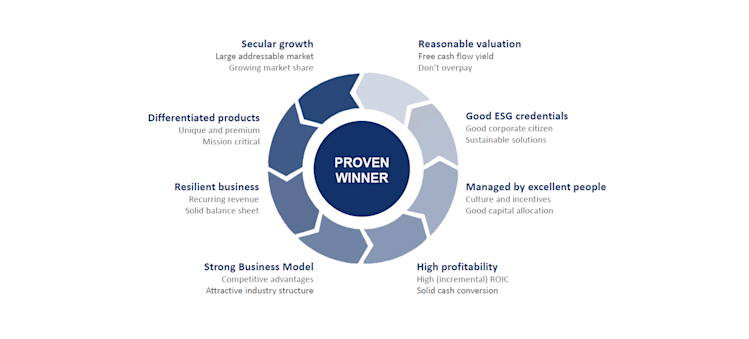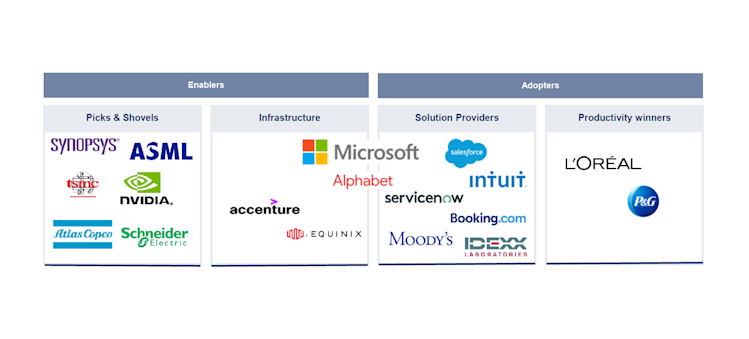
Equity
“It’s not just Nvidia”—how proven winners are thriving in the age of GenAI
Back to all
Generative AI (GenAI) – which can be defined as tools that can generate texts, images, sounds, and videos – has been adopted at a rapid pace by companies and individuals. ChatGPT experienced the fastest app adoption in history: two months was the time necessary to reach 100 million users.
The traits of technology leaders and our pillars of proven winners
Like we discussed in an earlier article, the specific traits exhibited by technology leaders, particularly in successful AI implementation, align closely with our pillars of proven winners, reinforcing the importance of these characteristics in identifying high-quality stocks.
The pillars of proven winners

Source: DPAM, 2024
A solid balance sheet and robust cash conversion, for instance, are not just indicators of financial stability; they also provide the necessary resources to invest in GenAI early on, enabling companies to establish a first-mover advantage and scale the technology effectively. This financial strength is essential for driving innovation and staying ahead of the competition in rapidly evolving markets.
Furthermore, the ability to deploy capital at high returns on invested capital (ROIC) is exemplified in AI implementation, where companies strategically invest in technology to drive efficiency and generate value. AI serves as an example of capital deployment that can yield significant returns when implemented effectively, further underscoring the importance of this criterion in our investment framework.
The presence of high-performing leaders and a strong corporate culture with aligned incentives is crucial in extracting maximum value from any capital deployment decisions such as GenAI implementation. Effective leadership fosters innovation, drives organisational change, and ensures that investments in technology are strategically aligned with business objectives. A culture of innovation encourages experimentation and risk-taking, essential components of successful AI implementation.
Moreover, successful AI implementation reinforces other criteria of our proven winners framework. Differentiated products, for example, are further enhanced by AI, which can help companies develop innovative solutions that set them apart from competitors. Similarly, AI can contribute to growing market share by enabling companies to deliver better products faster, thus solidifying their competitive advantages in the market. However, it's essential to note that while many companies may implement AI, those with significant competitive advantages will be best positioned to capitalise on the value creation potential of AI, while others may struggle to realise its full benefits due to increased competition.
AI implementation across our proven winners
We identified two types of “AI” companies across our portfolio:
AI Enablers are companies supplying the crucial and necessary technology underlying AI services or products,
AI Adopters are providing AI services and products to end users that are receiving meaningful productivity gains, among others, from their use of AI.
AI enablers and AI adopters

Source: DPAM, 2024
AI Enablers
Together, the design software and intellectual property of Synopsys, the equipment from ASML and ASM International, the manufacturing capabilities of TSMC, and the vacuum pump of Atlas Copco enable the production of the powerful GPUs of Nvidia, which power the cloud platform and AI services of Microsoft and Alphabet hosted partly in Equinix data centres powered by Schneider Electric equipment. Together, they form a comprehensive ecosystem that drives advancements in AI hardware, software, and infrastructure. As AI continues to revolutionise various sectors, these companies play indispensable roles in shaping the future of artificial intelligence. These topics have been widely covered by us and the financial community over the last year.
AI Adopters
AI adopters can reap significant benefits across common themes: accelerating product development, improving marketing efficiency, enabling automation, driving productivity, and even more sector-specific applications like accelerating medical and scientific discovery. The latter could support our health care picks and shovels like Thermo Fisher, Danaher, and Lonza.
Across our portfolio, we’re exposed to some of the most crucial solution providers driving these efficiencies across sectors, like Salesforce for Customer Relationship Management, Intuit for tax filing and accounting for small and medium businesses, Moody's sitting on a pile of data for the financial industry, Booking as the largest online travel agency, and Idexx Laboratories for animal diagnostics. All these companies are integrating AI into their products to enhance user experiences and streamline processes to drive productivity, enable automation, and deliver greater value to customers.
Let’s dive deeper into these examples.
Salesforce utilises AI to enhance customer relationship management (CRM) systems. AI-powered tools analyse customer data, interactions, and patterns to provide insights and predictions that help businesses better understand their customers, anticipate their needs, and personalise marketing and sales strategies. This enables Salesforce to offer more effective CRM solutions that drive customer engagement, retention, and revenue growth for its clients.
Intuit integrates AI technologies across its suite of financial management software, including QuickBooks and TurboTax, to simplify accounting processes, maximise tax deductions, and improve financial decision-making for small businesses and individuals. Through AI-driven features such as expense categorisation, invoice management, and tax filing assistance, Intuit's products enable users to save time, reduce errors, and optimise financial outcomes. By automating manual tasks and providing actionable insights, Intuit empowers users to focus on strategic initiatives, minimise financial risks, and achieve greater financial success.
Moody’s utilises AI for risk assessment, credit analysis, and financial forecasting. AI algorithms analyse vast amounts of financial (proprietary) data, market trends, and economic indicators to provide accurate credit ratings, risk assessments, and predictive analytics to investors, businesses, and financial institutions.
Booking.com has harnessed AI for years to enhance the booking experience for travellers. AI-powered algorithms analyse user behaviour, preferences, and booking history to personalise search results, recommendations, and travel suggestions. In the longer term, Booking is also working on a connected trip powered by an AI travel assistant to help customers plan, book, and enjoy. Concretely, if your flight is late, Booking will automatically inform the car rental company and the hotel. If you stay at a beach location but it’s raining all day, your Booking AI Assistant will suggest alternative activities.
IDEXX Laboratories has utilised AI for veterinary diagnostics since 2019. AI-powered diagnostic tools analyse medical images such as X-rays and blood samples to identify diseases, anomalies, and health risks in animals. This enables veterinarians to make faster and more accurate diagnoses, leading to better treatment outcomes and improved animal healthcare.
In summary, AI enables these companies to bring solutions to their customers by leveraging data-driven insights, automation, personalisation, and predictive analytics to address specific needs and challenges within their respective industries. These companies didn’t wait for ChatGPT to embrace AI; they have been on that journey for years thanks to forward-looking leaders.
AI leadership isn’t confined to software or data companies. Most productivity winners are outside of the technology sector, and some of the most obvious examples are in the consumer sector. L'Oréal and Procter & Gamble are good examples of companies benefiting from accelerated product development, improved marketing efficiency, and increased productivity as a result of GenAI adoption.
L'Oréal is a 'digital-first' company, leading in AI adoption, with a strong digital culture and digital integration across every aspect of the business to drive productivity gains.
By pioneering initiatives like TrendSpotter, powered by AI and machine learning, L'Oréal anticipates beauty trends earlier than competitors, giving them a crucial edge in product development and marketing.
Additionally, their transformation of Sales and Operations processes, integrating data-driven decision-making, has optimised supply chain management, leading to improved efficiency. Through continuous investment in data programmes and platforms, L'Oréal ensures the quality and granularity of inputs, enabling initiatives like 'Demand Sensing' to improve demand planning accuracy and accelerate go-to-market time. These efforts have elevated L'Oréal's supply chain management.
BeautyGenius, L’Oréal personal beauty assistant, is providing consumers with accurate and personalised recommendations. Such tools are reinforcing brand loyalty, can drive premiumisation, and extend adoption.
Unbelievable a few years ago, L’oréal, a consumer company, was the opening keynote at CES 2024 (Consumer Electronics Show, Las Vegas), positioning the company as a prime example of how technology can drive competitive advantage in non-tech industries.
Mastering both data proficiency and AI capabilities presents a significant challenge for firms venturing into artificial intelligence. However, those who succeed in doing so will gain a competitive edge in the current decade. While these endeavours were previously associated mainly with tech-native companies, leading incumbents across sectors are now embracing them.
We aimed to demonstrate our investment process, deeply rooted in the identification of high-quality companies, aligns seamlessly with the traits exhibited by technology leaders who successfully implement AI solutions. Companies with solid financial foundations, strategic capital deployment, and innovative leadership and culture are well-positioned to not only weather the disruptions brought forth by AI but also thrive in the decades to come. By recognising the symbiotic relationship between GenAI integration and our pillars of proven winners, investors can be reassured this technological revolution is reinforcing the competitive positioning and competitive advantages of our companies for the years to come, driving growth, and securing sustainable returns.
Disclaimer
Degroof Petercam Asset Management SA/NV (DPAM) l rue Guimard 18, 1040 Brussels, Belgium l RPM/RPR Brussels l TVA BE 0886 223 276 l
Marketing Communication. Investing incurs risks.
The views and opinions contained herein are those of the individuals to whom they are attributed and may not necessarily represent views expressed or reflected in other DPAM communications, strategies or funds.
The provided information herein must be considered as having a general nature and does not, under any circumstances, intend to be tailored to your personal situation. Its content does not represent investment advice, nor does it constitute an offer, solicitation, recommendation or invitation to buy, sell, subscribe to or execute any other transaction with financial instruments. Neither does this document constitute independent or objective investment research or financial analysis or other form of general recommendation on transaction in financial instruments as referred to under Article 2, 2°, 5 of the law of 25 October 2016 relating to the access to the provision of investment services and the status and supervision of portfolio management companies and investment advisors. The information herein should thus not be considered as independent or objective investment research.
Past performances do not guarantee future results. All opinions and financial estimates are a reflection of the situation at issuance and are subject to amendments without notice. Changed market circumstance may render the opinions and statements incorrect.